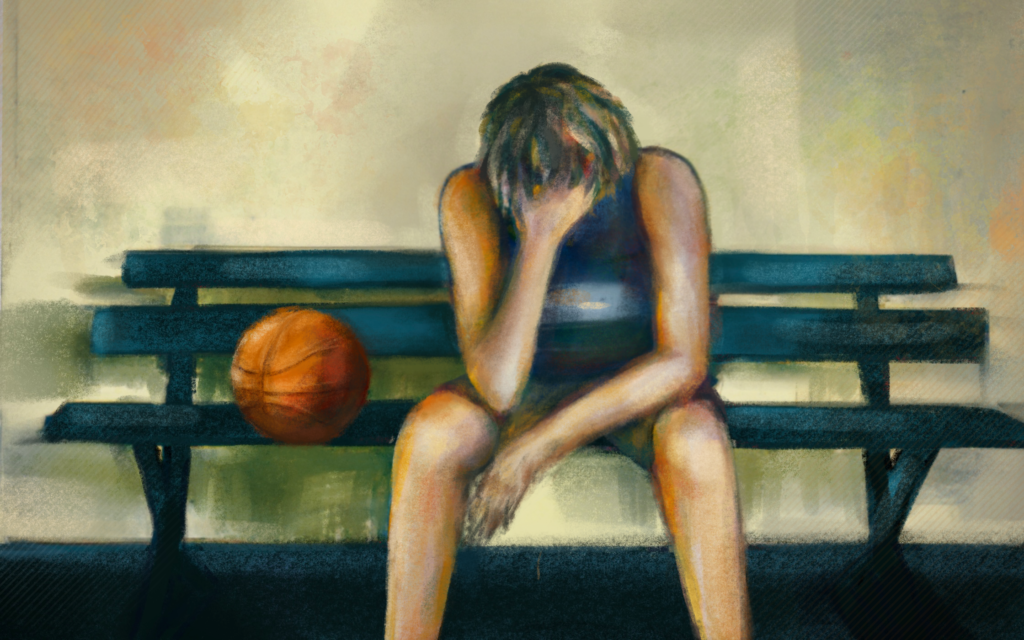
ILLUSTRATION/ Lexi Wang
By Tyler Lau,
Staff Writer
As he sat in the locker room scrolling through his phone, Cleveland Cavaliers forward Kevin Love looked through headlines on social media that read “Washed All-star,” “Injury-prone” and “Liability to the Cavs.” Behind him, a television blared the unmistakable voice of Stephen A. Smith wailing, “It is time! The Cleveland Cavaliers should trade Kevin Love!” Blamed for losses both when he played and when injured, Love found himself helpless and unable to be there for his teammates. With overwhelming publicity and the pressure of the world on his shoulders, Love spiraled down a dark, daunting and consuming pit of despair.
People hold athletes in high regard and often view them as confident, strong and fit individuals. The pressure to drain a free throw near the end of regulation to win the game, or to convert a field goal to go into overtime, are just a few of the many scenarios of internal and external pressures that cause athletes to be more prone to mental challenges than the average person. Mindfulness and acceptance of mental health issues help to overcome the stigma of mental health to create a more positive and accepting environment for athletes.
The stigma of mental health is a long-existing problem that continues to affect struggling individuals, especially athletes. The American Psychiatric Association explains that stigma is often broken down into two categories: public stigma and self-stigma. Through public stigma or external pressure, people with mental struggles are stereotyped by their community as weak, lazy, self-inflicting and attention-seeking. External pressures come in the form of expectations of athletic excellence from coaches, family and peers.
Oftentimes, public stigma directly leads to self-stigma or internal pressure, which is the internalized shame brought upon oneself, often in response to public stigma. Internal pressures include anxiety, unrealistic personal expectation and negative thoughts.
According to Athletes for Hope, 35% of professional athletes suffer from mental health crises derived from stress, burnout, depression and anxiety. Public stigma and outward pressures influence athletes to worry about their public image and neglect their mental health which can lead to being reluctant to receive professional help and being in denial of their battle with mental health.
TCHS student-athletes often have high expectations and demanding schedules. As a campus with high academic standards, our athletes are often focused on school and involved in many extracurricular activities.
External pressures in the form of demanding academic and athletic expectations from parents and coaches contribute to an athlete’s mental health struggles. The public stigma surrounding mental health additionally discourages student-athletes from admitting to needing support. The American College of Sports Medicine reports that among college student-athletes, 30% of women and 25% of men reported suffering from anxiety. Of these athletes, just 10% with known mental conditions sought proper care from medical professionals.
These statistics exemplify how athletes are pressured by stigma and external pressures to keep quiet about their mental health.
Athletes shouldn’t experience fear, pressure or anxiety regarding their mental health. Public perception and fear of judgment shouldn’t be an obstacle to mental recovery; our attitudes toward athlete mental health must change.
Love, a pioneer of mental health mindfulness in sports, leads by example through his efforts to overcome the mental health stigma. Athletes such as Love show that being open to care and support helps those struggling to recover. It is imperative to be mindful of the many struggles athletes face and accept any mental health issues athletes may have. As involved students, we have an obligation to support our student-athletes. Attending our CIF games or even congratulating our athletes in the hallways can go a long way. Because at the end of the day, no matter how invincible a person may seem, we are all human.
